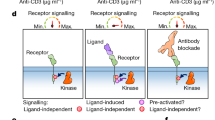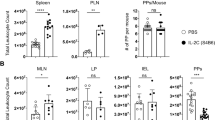Abstract
IMMUNE complexes are potent activators of inflammatory cells, triggering effector responses through the crosslinking of Fc receptors (FcRs) such as FcΣRI or FcγRIII (ref. 1). On B cells and mast cells, immune complexes are also negative regulators of activation triggered by antigen and Fc receptors, a consequence of coligation of the B-cell antigen receptor or FcΣRI, respectively, and the inhibitory receptor FcγRIIB. Here we show that inhibitory signalling by FcγRIIB does not require the SH2-domain-containing protein tyrosine phosphatase, SHP-1, in mast cells and results in the recruitment of the SH2-domain-containing inositol polyphosphate 5-phosphatase, SHIP, to the tyrosine-phosphorylated 13-amino-acid inhibitory motif of FcγRIIB in both B cells and mast cells. SHIP, by hydrolysing the 5-phosphate of phosphatidylinositol(3,4,5)P3 and inositol(l,3,4,5)P4, suggests a mechanism by which FcγRIIB can inhibit calcium influx and downstream responses triggered by immune receptors.
This is a preview of subscription content, access via your institution
Access options
Subscribe to this journal
Receive 51 print issues and online access
$199.00 per year
only $3.90 per issue
Buy this article
- Purchase on Springer Link
- Instant access to full article PDF
Prices may be subject to local taxes which are calculated during checkout
Similar content being viewed by others
References
Ravetch, J. V. Cell 78, 553–560 (1994).
Takai, T. et al. Nature 379, 346–349 (1996).
Daeron, M. et al. J. Clin. Invest. 95, 577–585 (1995).
Daeron, M. et al. Immunity 3, 635–646 (1995).
D'Ambrosio, D. et al. Science 268, 293–297 (1995).
Pani, G. et al. J. Exp. Med. 181, 2077–2084 (1995).
Amigorena, S. et al. Science 256, 1808–1812 (1992).
Muta, T. et al. Nature 368, 70–73 (1994).
Katz, H. R. et al. J. Immunol. 148, 868–871 (1992).
Damen, J. E. et al. Proc. Natl Acad. Sci. USA 93, 1689–1693 (1996).
Kavanaugh, W. M. et al. Curr. Biol. 6, 438–445 (1996).
Luckhoff, A. & Clapham, D. E. Nature 355, 356–358 (1992).
Toker, A. et al. J. Biol. Chem. 269, 32358–32367 (1994).
Rameh, L. E., Chen, C. S. & Cantley, L. C. Cell 83, 821–830 (1995).
Galandrini, R. et al. J. Exp. Med. 183, 179–186 (1996).
Daeron, M. et al. J. Immunol. 149, 1365–1373 (1992).
Grynkiewicz, G., Poenie, M. & Tsien, R. Y. J. Biol. Chem. 260, 3440–3450 (1985).
Erdjument-Bromage, H. et al. Prot. Sci. 3, 2435–2446 (1994).
Elicone, C. et al. J. Chromatogr. 676, 121–137 (1994).
Author information
Authors and Affiliations
Rights and permissions
About this article
Cite this article
Ono, M., Bolland, S., Tempst, P. et al. Role of the inositol phosphatase SHIP in negative regulation of the immune system by the receptor FeγRIIB. Nature 383, 263–266 (1996). https://doi.org/10.1038/383263a0
Received:
Accepted:
Issue Date:
DOI: https://doi.org/10.1038/383263a0
This article is cited by
-
Perspective view of allogeneic IgG tumor immunotherapy
Cancer Cell International (2024)
-
sFgl2 gene-modified MSCs regulate the differentiation of CD4+ T cells in the treatment of autoimmune hepatitis
Stem Cell Research & Therapy (2023)
-
Increased levels of a pro-inflammatory IgG receptor in the midbrain of people with schizophrenia
Journal of Neuroinflammation (2022)
-
Activation and regulation of alloreactive T cell immunity in solid organ transplantation
Nature Reviews Nephrology (2022)
-
B Cell Aberrance in Lupus: the Ringleader and the Solution
Clinical Reviews in Allergy & Immunology (2022)
Comments
By submitting a comment you agree to abide by our Terms and Community Guidelines. If you find something abusive or that does not comply with our terms or guidelines please flag it as inappropriate.



